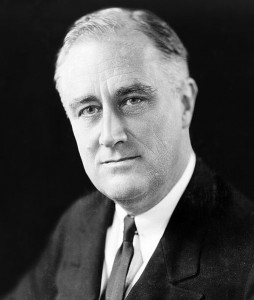
President Franklin Roosevelt
In the 132 years between 1797 and 1929, there was no effective regulation of the U.S. economy. No federal agencies existed to control corruption, fraud and exploitation on the part of the business class. Even during the Civil War, economic management on a national level was minimal and war profiteering common.
As a result the country experienced 33 major economic downturns which impacted roughly 60 of the years in question. These included 22 recessions, four depressions, and seven economic "panics" (bank runs and failures).
Then came the Great Depression, starting with the crash of the New York stock market in 1929. This soon became a worldwide affair which lasted until the onset of World War II. Millions were thrown out of work, agricultural production partially collapsed, and the fear of rebellion and revolution was palpable both in the U.S. and Europe.
It is to be noted that the way capitalism worked over these 132 years was a function of ideology. This was (and still is) the so-called free-market ideology which taught that if the government was kept as small as possible (basically having responsibility for internal order, external defense, and the enforcement of contracts), the citizenry would have to pay very low taxes and be left alone to pursue their own prosperity.
Thus, as the ideology goes, everyone would be free to maximize their own wealth and in doing so also maximize the wealth of the community as a whole.
The Great Depression was a real moment of truth for the capitalist West because it suggested to the open-minded that the free-market ideology was seriously flawed. Free-market practices had brought the economic system to the brink of collapse, and Russia's newly triumphant communists represented serious competition. So the question that had to be answered was how best to modify the capitalist system so as to preserve the position of the ruling elite.
It was President Franklin Delano Roosevelt who came up with an answer, at least for the United States. Through a series of economic and social experiments he crafted the New Deal and promoted the notion of the welfare state.
It should be emphasized that this was not socialism. In essence, the New Deal was capitalism with safety nets and subsidies. It meant that some entrepreneurs -- in areas such as agriculture, defense and other businesses -- actually got money from the government to produce their products.
On the other end of the spectrum, government money was made available to keep the really poor people from starving and the unemployed solvent while they sought new employment. A national pension plan was devised in the form of Social Security, and bank deposits up to a certain amount were insured.
In addition, new agencies were created to monitor business activities, particularly the stock market and the banks, to prevent the sort of activities that had brought on many of the economic downturns of the past. This was a major step away from the ideal of a wholly free market but most of the citizenry, with the Great Depression at their backs, understood the necessity of the New Deal. Of course, taxes would eventually have to go up to help pay for it all.
How Quickly We Forget
Essentially, Roosevelt and the New Deal saved capitalism from itself.
Left to those, such as Herbert Hoover, who could not escape the paradigm
of free-market ideology, capitalism in the U.S. may well have followed
much of Europe in succumbing to the revolutionary movements of the Right
or the Left.
It has been 67 years since the end of WWII and during that time there have been 11 recessions impacting only 10 years of that time span. Most of these recessions have been mild affairs compared to the 33 that came prior to the onset of the Great Depression, and the welfare safety net has helped the hardest hit to survive. However, since the 1980s, the U.S. economy has become more unstable and some of the downturns more severe.
What of the steadfast adherents to the free market ideology? It would have been nice for the world if the Great Depression had put an end to them all -- but that was not to be. For those who can understand things only with the help of rigid and all inclusive paradigms, ideology is what makes sense of an otherwise chaotic world.
Ideology is also what defines good and evil for such minds. So it stood to reason that many committed free marketeers would retreat into a temporary silence and wait for a time to reassert their beliefs.
It did not take long. In fact, counting from 1939 and the outbreak of the World War II (the event that finally marked the end of the Great Depression), it took only until 1980 or 41 years. That is two generations which is actually just about right.
(Note: You can view every article as one long page if you sign up as an Advocate Member, or higher).




